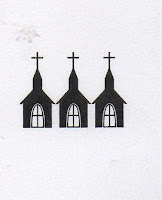I've seen some interesting ideas for fundraising in films, ideas never raised at any church board meetings I've attended: writing a hit song or a bestselling novel, wrestling or boxing, and a number of bets on the horses. But the Western Hellfire (1949) features a truly unique form of bringing in the bucks -- hanging out with a wanted criminal until she turns herself in for the reward money. Genius.
The film begins with a slightly more conventional means of fundraising. A pastor, Brother Joseph (played by H. B. Warner, who also played Jesus in the 1927 version of King of Kings) goes into a saloon, where he asks patrons for money to build a church. When a man who throws a drink in Brother Joseph's face, a gambler comes to the pastor's defense. It’s not for the pastor's sake; the gambler’s drink was the one thrown.
That same gambler, Zeb Smith, is caught cheating. The crowd wants to lynch him, but the preacher proclaims, "Thou shalt not kill!" Someone pulls a gun. Joseph jumps in front of the bullet, saving Zeb's life but losing his own.
Zeb cares for Joseph in his last hours, and he tells the preacher he doesn't like being in debt to anyone. He asks what he can do to repay Brother Joseph for saving his life. The pastor asks him to raise the money to build a church, and also to raise the money following the commands of the Bible.
Zeb says he's not going to follow the hooey in that "Rule Book" (Zeb refers to the Bible as "the Rule Book" throughout the remainder of the film). The preacher says, "What if I called your horse a swaybacked, spavined old hunk of coyote bait without seeing it? What would you think of me?"
"I'd think you were a fool."
"Same if you pass judgment on the Book without reading it."
Brother Joseph dies, but Zeb makes it his goal to raise the money to build a church. He can't cheat at cards anymore because that's against the Rule Book, but he does start card games, show he could have won, gives the money back, and asks for donations. This doesn't work very well. He ends up being insulted just as Brother Joseph was, but Zeb fights back (even though "the Rule Book says I should be peaceable").
Zeb sees the woman outlaw, Doll Brown, shoot a man down in the street and decides to track her down. When he does, he tells her he won't shoot her or turn her in, because that will go against the book. He also tells her he believes that eventually she'll turn herself in, and the reward money could go to building a church. He says he has the faith the Rule Book taught. He has faith that she'll come to have faith too.
The film is one of the many cheap Westerns Republic Pictures made back in the day; Republic made a lot of John Wayne's B pictures. The only face modern audiences are likely to recognize is the sheriff played by Forrest Tucker (who played Sgt. O'Rourke on F-Troop), but the positive portrayal of the Bible as a guide for life is something that would be almost unheard of in a mainstream film these days.
And though I wouldn't recommend passing a hat in a bar as a fundraising method, Brother Joseph's willingness to give up his life for a stranger earns him and the church he wanted to build Three Steeples.


No comments:
Post a Comment